- Home
- Adam Silvera
History Is All You Left Me Page 4
History Is All You Left Me Read online
Page 4
“Which you do all the time.”
He shakes his head. “It’s not the same thing. You’re passionate about this. There’s also no way in hell I’d have even gotten Dumbledore’s first name.”
“You’re forced to be nice to me because I just lost,” I say.
Theo takes the sword from my hand. “Kneel before the king, Griff.” I look around for the king. “Me, asshole. I’m the king. Who else would be the king? Wade?”
I laugh in spite of myself and get down on one knee, bowing my head as he knights me.
“On this rainy Thursday, I, King Theo of New York City, praise you, Sir Griffin of New York City, for your vast knowledge of fantasy novels I’ll never take the time to read myself. And for having the kind of laugh that I like hearing so much I would punch myself over and over if you found it funny.”
I rise, still grinning at our own stupidity. Theo twirls the sword between his fingers and swings, but I deflect him with the shield. I keep blocking his attacks. We ignore the waiters asking us to stop playing and eventually run toward the pinball machines, where I finally drop the shield.
“I surrender!” I say. “It’s surrender, right? Not forfeit?”
“My work here is done. I have nothing left to teach you, Sir Griffin of New York City.” Theo is brandishing his sword, victorious.
I disarm us both as I kiss him, the plastic sword clattering at our feet as he pulls me closer to him.
This feels right, even as our teeth clink. I laugh when we part.
“That’s a thing we just did,” I say.
“Let’s do it more often,” Theo says.
TODAY
Monday, November 20th, 2016
Jackson Wright is here, and there’s no not talking about him anymore.
There’s no denying Jackson and I resemble each other; even Wade joked about it. His hair is a little darker and longer than mine, but still light brown at first look. We’re lanky, with bad posture, and we both looked back into your blue eyes with our hazels. You mentioned becoming fixated with the horseshoe-shaped birthmark on his collarbone, much like whenever you traced the “deflated pyramid” on my inner thigh. The big difference between us right now is I’m here at your funeral in your old hoodie and jeans, and he’s wearing a suit that’s a size too big for him. The suit makes sense, though I’m not sure what an eighteen-year-old in California would do with one.
Here’s your history with Jackson as you told it to me: You met him last year on October 29th while walking along the highway. You were on your way to tutor that high-school junior, while Jackson was driving from his mother’s house to spend the weekend with his father. The rain surprised you, which doesn’t surprise me since you always refused to check the weather app; you prided yourself on adapting to any outside conditions.
Lucky for you, Jackson came to the rescue.
He’d seen you before during this same drive and thought you looked friendly. He was curious about how you existed in California without a car or bike or “some flying carpet.” You thought the flying carpet bit was funny. I thought it was uninspired. It’s possible I’m programmed to be a dick to anyone interested in you. But really, let’s not rule out Jackson’s joke sucked because—
I’m letting it go. I’m moving on.
Jackson pulled over and offered you a ride. He was a stranger, but from everything you told me about the impossibly perfect weather in California, it sounds like rain is the first wave of the zombie-pirate apocalypse, so I guess you can’t be faulted. Just sucks you were looking for a new partner to aid you in what was supposed to be our alternate universe.
In the car, you and Jackson bonded over films and role-playing games. And the rest is unfortunately history.
First: The phone call on November 7th detailing this new guy in your life. I had hoped your time with Jackson would just be a quick thing, but it stretched to a point where I couldn’t deny our own endgame was threatened. I wanted to know exactly what he looked like, what his story was, what your dates were like, what it was about him that mesmerized you.
Jackson is blocking the door. Your dad is trying to reenter the chapel. He has definitely been smoking hard core, and the smell nauseates me instantly, reminding me of all the times he drove us around in his car that stunk of stale cigarettes and air freshener before he finally quit. (Until now.) Your dad doesn’t acknowledge Jackson beyond a hand on the shoulder, and while this is sick to admit, it makes me feel good. Jackson flew here, but he isn’t getting much from the man who taught you how to tie your shoes and ride a bike.
My dad approaches yours. My mom remains close to me. Wade reappears by my side. I don’t know if Wade is nervous over how this is about to go down between Jackson and me or if he’s showing me support, but I don’t need him right now. I need to do this alone. But right when I’m about to go over to Jackson, your dad and mine step toward me.
“Hey, Russell,” I say, twisting my ring finger. It’s an antistress trick you taught me, used by people who are afraid of flying—not that I’m ever getting on a plane.
I last spoke with your dad on the phone the day you died, and again the day after, but this is the first time I’m seeing him. He’s wearing his reading glasses instead of the horn-rimmed frames he should be, and when he opens his mouth to speak, I notice his teeth have yellowed. He shuts himself up. There’s no point asking him how he’s doing. I hug him, battling through the invisible cigarette cloud.
“You still think you have it in you to share some words?” Russell murmurs.
I step back and nod. I can’t believe I live in a universe where I’m delivering a eulogy for you.
He pats me on the shoulder, like he did Jackson, and walks away to check on Ellen in the service room.
Jackson is making his way toward me, eyes lowered and hands pocketed. My parents and Wade are staring at me. I quietly ask them to give us a minute. I’m not sure if Jackson even wants to talk to me, but it’s happening. My mom tells me she’ll hold a seat for me. They all leave, and Wade looks over his shoulder as if he’s expecting something explosive. There will be no fights at your funeral, I promise.
Suddenly, I’m standing face-to-face with your boyfriend. His left eye is stained red, and he smells like cigarette smoke, too.
“Hey, Griffin,” Jackson says.
He says my name like we’re friends.
Funny, as I refused to meet him when you brought him here in February for your birthday. No way in hell was I going to go to one of our places with him. And we didn’t exactly check in with each other after you died, not that anyone thought we would. I thought of him, sure, but not so much about how he was doing as I’ve been wondering what the hell your final moments were like.
He was there with you.
Is it weird to envy him for that, for witnessing something I would never want to see with my own eyes? I have all this history with you, Theo, but he has pieces of your puzzle that would destroy me if I ever had to put them together, and yet I still want them.
“Hey, Jackson,” I say. We don’t offer each other condolences. Maybe he’s waiting for me to do so; he’s going to be waiting for a while. “What’s wrong with your eye?”
“Popped a blood vessel,” Jackson says. “Doctor doesn’t know if it’s from all the crying or screaming. It’ll go away.”
I didn’t know someone could pop a blood vessel from crying. That’s something you would know.
Jackson moves past me to get to your cutout. He doesn’t touch your face or trace your nameplate. He rests his forehead against yours—not an even fit, obviously—and closes his eyes.
“I miss you, Theodore,” he says.
Using your given name is so unexpectedly intimate, and you weren’t about being called that. You thought it made you sound too stiff and presidential. I’m not going to call him out on that. I can’t. What if you changed your mind? What if I out
myself for truly not knowing who you were before you died?
“How long are you in town for?” I ask. Seems nicer than asking him when the hell he’s going to leave.
Jackson turns, shrugs. “I got here last night. I’m thinking about staying another week or two.”
I know from you his mother has spent the past few years in a wheelchair, so it’s safe to bet she’s not here with him.
“You staying with friends?”
You’d mentioned Jackson had “theater friends” at NYU when he visited in February, though I’m not sure you two ever got around to meeting up with them—not with all the time you spent with your family, including the traditional movie-theater outing on your birthday. You must’ve shared a recliner seat with Jackson; that used to be our throne, Theo.
“I’m staying with the McIntyres,” Jackson says.
I’m such an idiot. He smells like cigarette smoke because he was outside with your dad, and he only got the shoulder pat because he’s been with them since last night. He must be staying in your room. Of course he is. He’s chief curator in the main exhibit of the McIntyre Museum, taking in all the archives of your life. I can see it all: our framed puzzles on your light-blue walls, a bookcase full of sketches you later animated at wicked speed, awards you didn’t mind “showing off,” your computer station decked out with robot magnets and old Tetris cartridges, the golden unicycle wheel you won at that carnival in the Bronx last summer, the plastic bat you used to beat the piñata at Denise’s seventh birthday, then saved for the zombie-pirate apocalypse . . .
The outsider is inside the nexus of your life, and I hate it.
“We should probably take our seats,” Jackson says. He checks his watch; it’s an old one of yours. The way he flashes it is hardly discreet. “The mass is probably starting any minute now.”
We walk into the service room together. I switch sides when he walks to my left. He doesn’t pay it any mind, going straight for the empty seat in the front beside your mother. Ellen is in full black and silent, resting her head on Russell’s shoulder. I’m ready to rage over where Jackson found the nerve to sit next to your parents, when my eyes find your body.
Even seeing it isn’t enough to believe it.
You’re in a mahogany casket, dressed in a black suit I don’t remember you owning. There are tons of flowers placed around you. It reminds me of the summer afternoon you confessed your love of calla lilies, scared to admit it because “flowers aren’t manly.” When I rambled about my secret obsession with immortality irises after discovering them in some comic, it became a happily manly conversation. Afterward, we’d occasionally visit your grandmother’s flower shop before it closed last winter, losing out to all her competitors during the Valentine’s Day rush. I process the flowers in the room again, not spotting any calla lilies.
I should’ve brought some white ones, your favorite. I’m sorry.
I walk toward you even though I know it’s not time for that. The minister is about to lead everyone in prayer or sing a hymn, but it’s you, Theo, in a box. My vision shakes, my knees tremble. My mom calls for me, and my dad appears at my left side, pulling my arm. I shake him off and switch sides before letting him guide me to our seats on the far left of the room, away from your family and Jackson. The seat is uncomfortable. Too many eyes are on me, so I sink to the carpeted floor, crossing my legs like it’s fifth grade all over again.
Father Jeffrey opens with a verse, Matthew 5:4: “Blessed are those who mourn, for they will be comforted.”
I guess there is something comforting about being in a room with people who love you. But you should’ve been given more time in this universe. That way, when you were ready to die, you could pack stadiums with people who loved you, not a single room.
There are hymns sung, but not by me. We agreed that I can do a lot of things—like keep up with a car for four blocks before losing my breath or ride a bike with no hands for long stretches of time—but I cannot sing. Jackson is singing, though. I can’t make out his voice in the chorus of others, but he’s looking at you with a tilted head, like a curious child asking you why you’re sleeping in a box.
The eulogies begin, and they’re brutal. Your mother is the first one up, and she tries to joke about the nineteen-hour labor she went through with you, before she shuts down and quickly reboots. She tells everyone how she’ll miss nursing you back to health whenever you were sick, and how she regrets confiscating your Xbox One after you received a C+ on your earth science midterm. Denise is next. She tells everyone how you two used to have dance parties in the living room, which I never knew, and when she loses it, I snap up from the floor and race toward her because you’re in a casket unable to do so yourself, inviting her to sit back down with me.
I’m not surprised your father tells the story about how your first word, “sock,” was the first time it clicked with him that you were a little human being that was going to grow up to use all kinds of words to get around the world. Aunt Clara will miss your “funny little movies.” Uncle Ned doesn’t know who he’ll talk to about engines anymore. Wade keeps it quick, too, saying he misses you so much already and apologizes for wronging you. Your neighbor, Simone, is still grateful for the month you went grocery shopping for her after she crushed her leg in a car accident.
Then it’s my turn.
Not sure what they want to hear from me.
Maybe they’re interested in how our friendship began in middle school over Pompeii. And now I’m supposed to be delivering your eulogy.
I rise, helping Denise up from the floor, too. I encourage her to rejoin your parents, which she does without a fight.
I walk closer to you, your face touched up with makeup, and you don’t look like the boy I love. Your body has your features, sure, but you’re sort of chalky and very unnatural and it sends a bad chill running up my arms. The bright blue tie they chose for you would’ve gone beautifully with your open eyes. I slip into the memory of you at your graduation party, superimposing this blue tie over the green one you were wearing to see what it would look like, and then I pull myself out of this reimagining because I can’t change our history. I can’t begin remembering you wrong.
“One moment,” I tell the room.
I walk all the way to you, gripping the frame of your casket. I check my watch, waiting for the next even minute—10:42—and I touch your folded hands. You’re cold, I knew you’d be, but holding you after not being able to touch you in so long reminds me of last summer’s beach bonfire; the warmth of the glowing fire, our two-man huddle on the sand. But unlike that night, where we promised each other your leaving for college wouldn’t ruin us, I’m stuck having one-sided conversations with you as your boyfriend sits behind me. I squeeze your hands, crying a little.
I’m going to tell your friends and family a story about you, okay? I’m not going far.
I let go and turn around.
I step to the center, staring at nothing but shoes and the podium I’m tempted to hide behind.
“I love Theo,” I say, choking. I tug at my right earlobe, squeezing it between my thumb and middle finger. “He’s been my best friend since I was ten, my favorite person, who was supposed to exist forever. I told him everything, even the things about myself that scared me. Like the time I came out to him as a possible crazy person the same second he told me he was gay . . .” I tell them a bit about how we threw off our straight cloaks two years ago on June 8th, and how it taught me that honesty sometimes leads to happiness.
The memory quickly comes and goes.
I’m crying now, full on, and one hand is pulling at my ear and the other is pressed against my chest. “He made me feel safe from the world, and made me feel safe from myself.” My legs are going to give out. “I don’t know where to go from here. I don’t think any of us do. No one would’ve ever thrown down money, betting we’d be saying goodbye to Theo so soon, and it’s not fair and
it’s a total nightmare. But we all have mad love for Theo, and history is how we get to keep him.”
I make my way back to my spot on the floor, thinking of a thousand more things I want to say. My dad leans over and kisses the top of my head. He tells me I did a good job, but he doesn’t know anything. I’ve said enough to everyone here, but there’s still so much I have to tell you.
Father Jeffrey approaches the altar when Jackson hops out of his seat. He steps to the podium.
“Hi everyone, I’m Jackson,” he announces in a tight voice. “I was Theo’s boyfriend in California.”
I can’t listen to this.
Except I have to. For sanity’s sake I’m going to soldier through this eulogy. You wouldn’t want me writing you off or running away. Though it gets me wondering again if you ever told him stories of me, or if you hogged memories of our time together the way you did with him. I don’t know which of the two is winning—your eagerness to tell a story about us because not doing so was suffocating, or keeping our history close to your chest like an inside joke you couldn’t possibly let anyone else in on.
Jackson is fidgety, tugging at your old watch. “My parents have been divorced since I was fourteen. Even as a kid I could tell they weren’t in love. When I finally got my driver’s license this year, it was awesome because we didn’t have to go through the awkward drop-off where my parents barely said hi to each other. I didn’t think I’d find someone I loved while driving between my parents’ houses on weekends. I didn’t even recognize it was the same guy until the third or fourth time. But one day it was raining, and I saw him on my way to Mom’s house, same time as usual, and he didn’t have an umbrella. So I pulled over, and he asked me if I often rescued strangers from the rain.”
I can hear the words out of your own mouth, Theo. My face heats up.
Jackson smiles to himself, remembering this memory I can already tell is too intimate, more than I ever thought I’d want to know. “I told him I’d seen him while driving several times and he seemed innocent, but better not turn out to be a murderer. Naturally, he found me suspicious for having an idea who he was, so he made a joke and threw his shoulder against the door, like he was trying to bust out.”

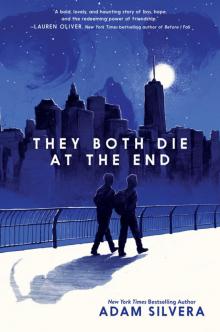 They Both Die at the End
They Both Die at the End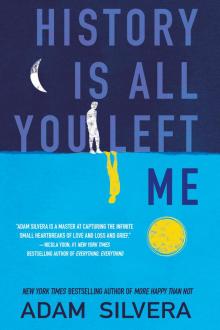 History Is All You Left Me
History Is All You Left Me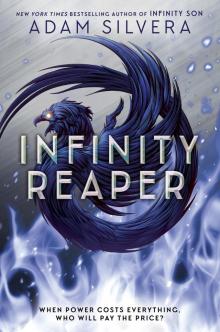 Infinity Reaper
Infinity Reaper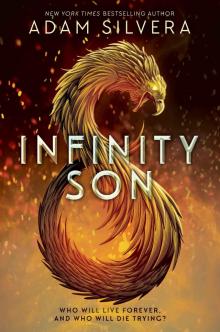 Infinity Son
Infinity Son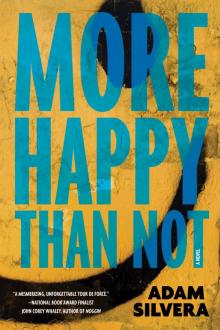 More Happy Than Not
More Happy Than Not